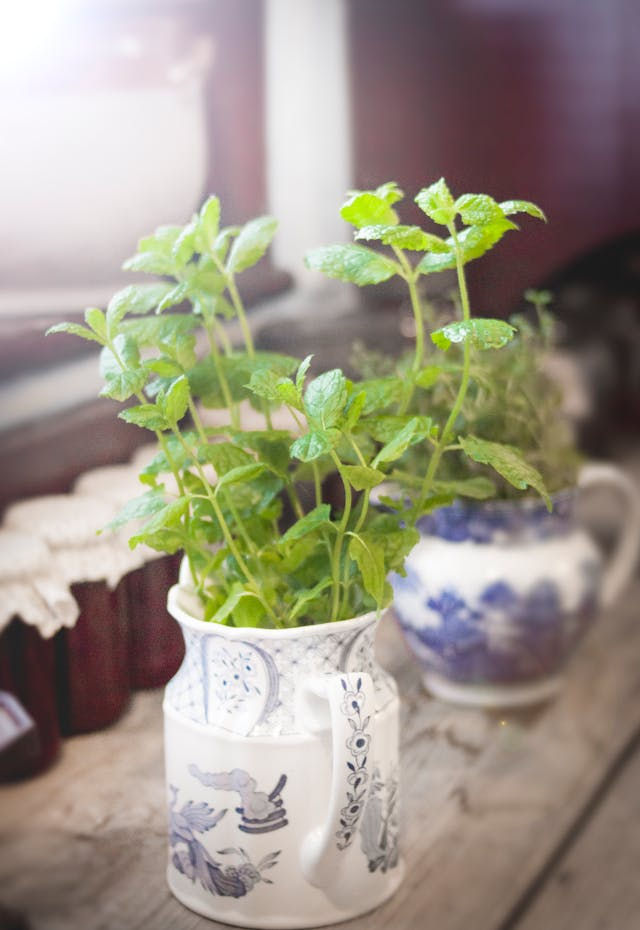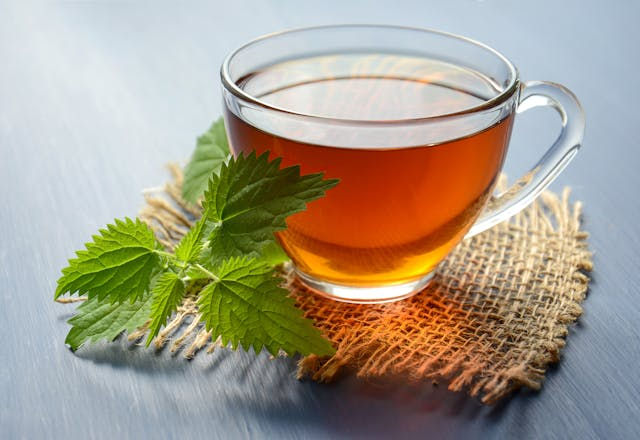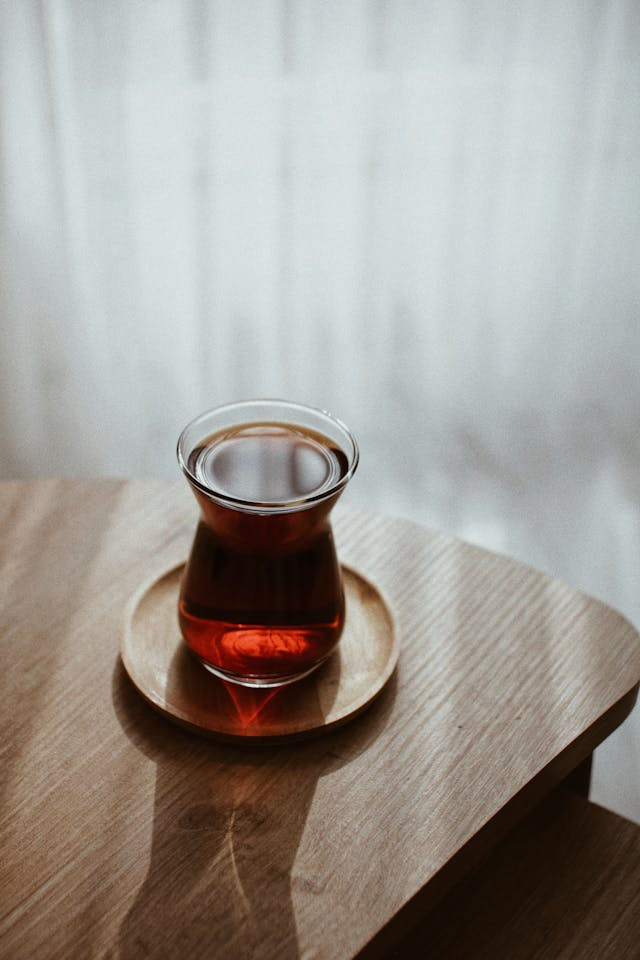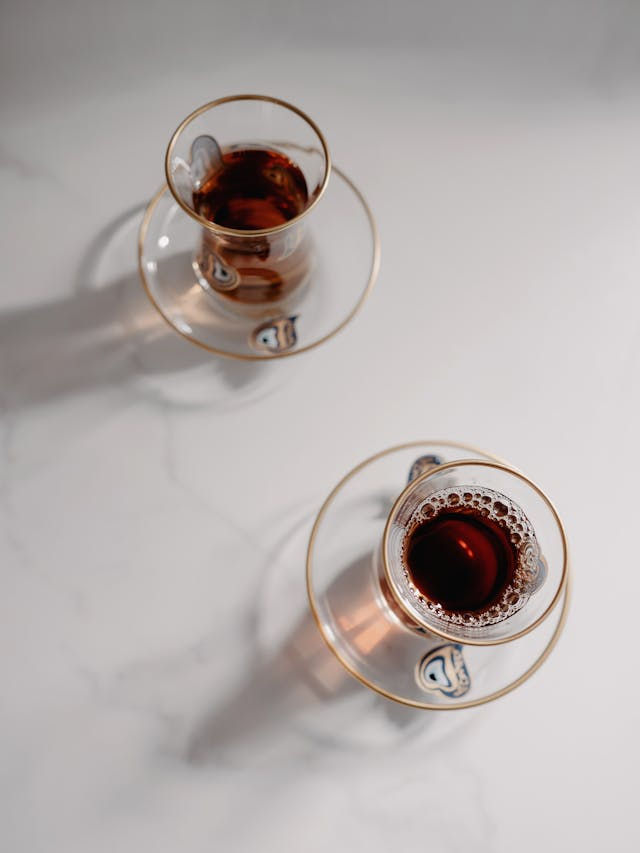Moroccan mint tea, also known as Maghrebi mint tea and Algerian mint tea, is gaining popularity these days in the US and the rest of the world. This traditional Moroccan tea is famous for its delicious taste. Moroccan mint tea is one of the things Morocco is famous for, and it's a sign of generosity and hospitality in Moroccan culture.

If you go to Morocco one day, they will serve you this hot drink at any time of the day, especially with sweets. You can't have a bite of sweets in Morocco without washing it down with a sip of refreshing Moroccan mint tea!
What Are the Ingredients of Moroccan Mint Tea?
Before we delve into the numerous benefits of Moroccan mint tea, let's first get to know it better and explore what ingredients are used to prepare it!
The ingredients of Moroccan mint tea are simple. It's made using:
1. Gunpowder Tea
Have you ever heard of gunpowder tea before? Well, if you haven't, now you get to know about it. Gunpowder tea is made of Chinese green tea or oolong tea, but the type that is used in making Moroccan mint tea is green tea.
The leaves of green tea are rolled into small pellets (hence the name gunpowder tea, though honestly, it doesn't resemble gunpowder to me), and after that, they are left to dry. When you add hot water to the small pellets, they unfurl and become large leaves. It's rather an interesting thing to watch.
2. Fresh Mint

The second key ingredient is fresh mint. Some people use dried mint, but I emphasize that fresh mint is better; you simply cannot have a Moroccan mint tea without using fresh mint sprigs. It adds an unbelievable freshness to the taste of the tea, not to mention that it has the most relaxing scent.
Benefits of Moroccan Mint Tea
As we said before, the benefits of Moroccan mint tea are numerous and diverse. So, without further ado, let's take a dive into some of the potential benefits you can reap from this delightful drink, which is rich in enzymes, minerals, and vitamins.
1. The Potential Protection Against Degenerative Diseases
Moroccan mint tea contains a flavonoid known as catechin; this flavonoid, according to studies, provides some protection against degenerative diseases.
2. Potential Prevention of Cancer

This effect can also be attributed to catechins. Because they are strong antioxidants, catechins may inhibit cancer cell proliferation. Yes! To the degree that catechins are now being considered for the synthesis of anticancer drugs. [source]. Green tea, which is used in making Moroccan mint tea, is associated with a reduced risk of breast cancer.
Drinking Moroccan mint tea can help prevent lung, esophagus, colon, stomach, mouth, small intestine, pancreas, kidney, and mammary gland cancers.
3. Blood Pressure Lowering Effect
Good news to those who have hypertension and those who are at risk of developing hypertension, Moroccan mint tea can reduce blood pressure levels. According to studies, polyphenols (compounds that are found in Moroccan mint tea) can reduce diastolic and systolic blood pressure levels. A reduction in blood pressure means that you are at lower risk of developing coronary heart disease and stroke.
4. Blood Sugar-lowering Effect

Another evidence-based benefit of catechins is that they can lower blood glucose levels. Catechin, the ingredient that we find in green tea, has a favorable effect on reducing fasting glucose levels and HbA1c levels. The flavonoids in Moroccan mint tea that’s made from dried green tea have also shown insulin-like properties and insulin-enhancing activity. This makes Moroccan mint tea a great option for diabetic patients.
5. Treating Diarrhoea
Moroccan mint tea can be used to reduce the frequency of diarrhea and vomiting. Green tea and mint are both beneficial for an upset stomach and have been used for centuries in the treatment of diarrhea and upset stomach.
6. Fighting Helicobacter Pylori

If you suffer from ulcers induced by Helicobacter pylori, then Moroccan mint tea may be good for you. This tea can have an inhibitory effect on bacteria, thereby reducing the bacterial count and limiting inflammation. Protection against Helicobacter pylori means that you will have extra protection against gastric cancer.
7. Antiviral Properties
Catechins, especially epigallocatechin, have demonstrated activity against the herpes virus. Studies have shown that epigallocatechin can inactivate herpes simplex virus type 1 and type 2. Not only that, tea catechins can also protect you from the influenza virus. Catechins inhibit influenza virus adsorption and suppress its replication. Studies have also suggested that regular consumption of tea catechins can decrease the rates of influenza and cold symptoms.
If you have the flu, you can gargle using tea catechins; this might prevent the development of the influenza infection.
8. Antifungal Properties

You are probably familiar with candidiasis, an infection caused by the fungus Candida albicans. Candidiasis causes a lot of commonly known infections, like vaginal yeast infections, thrush, and diaper rash. Tea catechins in Moroccan mint tea have antifungal properties and can be used to combat fungal infections caused by candida albicans.
9. Increasing Bone Density
This is specifically beneficial to menopausal women and older people. Lower estrogen levels after menopause can lead to osteoporosis. The flavonoids contained in Moroccan mint tea have estrogen-like properties that can increase bone density. It has also been reported that regular intake of green tea (the key ingredient in Moroccan mint tea) is associated with a lower risk of hip fracture.
10. Potential Protection from Liver Fibrosis
Liver fibrosis is closely connected to the proliferation of hepatic stellate cells. Epigallocatechin has a potentially inhibitory effect on those cells and might offer some protection against liver fibrosis.
11. Boosting the Immune System

Moroccan mint tea can strengthen the immune system by protecting it from oxidants and radicals. Epigallocatechin is a strong antioxidant and can help protect your cells from the damage caused by oxidation.
12. Anti-inflammatory Properties
Polyphenols have an anti-inflammatory action; this action makes Moroccan mint tea an excellent drink for people with arthritis and autoimmune disease and may improve the quality of their lives.
How to Prepare Moroccan Mint Tea
After reading about all the benefits you can get from drinking Moroccan mint tea, you must be looking forward to trying it yourself and incorporating it into your routine. The recipe is pretty simple; just follow the steps below:
Put five mint sprigs and a teaspoon and a half of gunpowder green tea in a teapot, then add sugar according to your preference.
Boil three cups of water, then pour the water into the teapot and swirl the mix a bit.
Put a mint sprig in a tea glass cup.
Leave the mixture in the pot for a few minutes, then pour it into the cup.
Now you can enjoy the wonderful taste.
Conclusion
Moroccan mint tea has a lot of benefits, and adding it to your routine can be good for you and your health in many ways. However, remember that it doesn't substitute for any treatment you take, and before you take it as a treatment for any medical condition, consult your doctor and take what they will say into consideration.

Comentarios